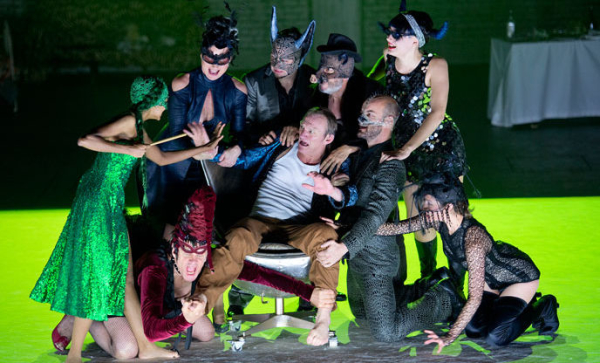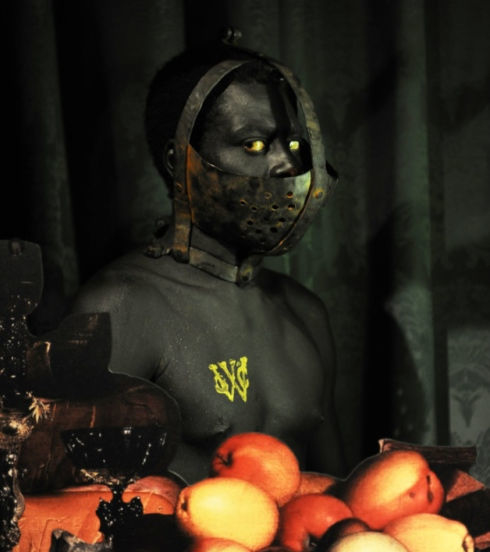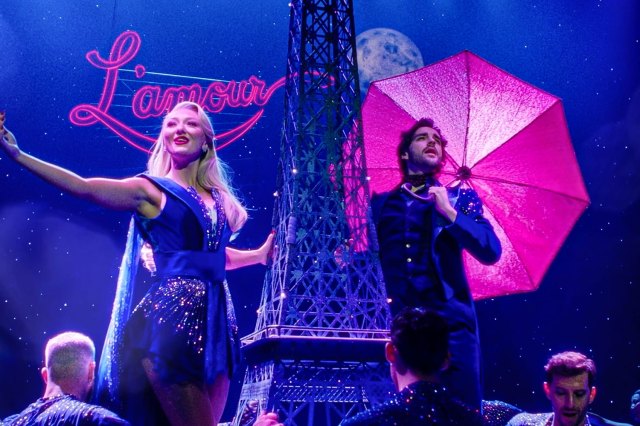Michael Coveney: Iggy pops into Peer Gynt, and Kenyon gives update on Barbican row
Pop meets Ibsen, while the Barbican’s managing director reflects on the ”Exhibit B” controversy

© Monika Ritterhaus
Only at the Barbican could you possibly expect to see Iggy Pop leap onto the stage in a shiny suit at the end of Ibsen's Peer Gynt; and there he was last night, taking a bow with director Irina Brook at the end of a three-hour journey of a rock star stripping off the onion to the hollow centre. Irina, Peter Brook's daughter, now runs the Théâtre National de Nice in the South of France, and opened this production – with two songs by Iggy Pop, twelve poems by Sam Shepard – at the Salzburg Festival two years ago.
It's not a bad idea to present Peer as a callow, rutting troubadour who finds out the hard way what living in the real world entails, but it is a limiting approach, and you do feel short-changed on the epic, mythical side of things, even if the set is dominated by a glowing reproduction of William Blake's "Albion Rose," an image, Brook says, representing the openness and light which humanity could aspire to in an ideal world. Iggy Pop seems to have come through his various ordeals in pretty good shape.
Peer Gynt only plays at the Barbican until Saturday, and I'd recommend it for its curiosity value, the energetic performance by the Icelandic actor Ingvar Eggert Sigurdsson who has been playing Peer on and off since 1991, and the infectious jazz rock score played by the actors themselves. But when you add it all up, this Peer comes a poor third behind the other two Barbican Peers, that of Michael Sheen cavorting brilliantly in the Frank McGuinness translation that is one of the very best, and Dominic Hill's production for the National Theatre of Scotland and the Dundee Rep.
The Barbican is a protest-free zone again after the unsavoury business of pulling Exhibit B out of the Vaults at the Waterloo Tunnels. The installation, which I didn't see, was a sort of human zoo, with a series of tableaux vivants featuring black actors playing object of colonial repression. This upset the organiser of the online petition, Sara Myers, who objected to these "offensive" reminders of her ancestors and the black community at large, in much the same way, I presume, as she objects to Chiewetel Ejiofor's movie 12 Years a Slave or any revival of Porgy and Bess.

Barbican boss Nick Kenyon is upset enough to clarify for WhatsOnStage what actually happened on the night of the opening last month. He and his colleague Louise Jeffreys were inside the Vaults (in the audience of 25) when the expected protest began; negotiations had already taken place with the protesters and the police, and no-one had thought of cancelling the performance. But of course the protest got out of hand, barriers were knocked over, the Vaults were stormed before the show could begin and the venue's management (not the Barbican) were told they would be taken hostage unless they signed a cancellation order for all the scheduled performances. On the advice of the police, they did so. This disgraceful incident, as Kenyon mildly remembers it, "was the wrong outcome for the show."
Of course, not only had Sara Myers misunderstood, says Kenyon, "what she thought the show was about," the social media flames were fanned by people who misunderstood what it was about even more and jumped on the racist bandwagon in a manner that can only be described as ill-informed and hysterical. All the same, Kenyon says the Barbican "needs to engage in dialogue going forward" with the black community – which is ironic, as no theatre has worked harder in recent years on its diversity and social inclusion programme – through their already well-developed relationships with organisations like Nitro and the Theatre Royal, Stratford East.
There were protests over Exhibit B in Berlin, but none at any of the other twelve venues where it's been presented, including the Edinburgh Fringe. On the freedom and race issues raised by Sara Myers, David Aaronovitch of The Times had the definitive last word, as he does on so many topics: "When the demonstrators last week decided to block the doors to the art exhibition, they dug up the long-dead slave-supporting, meeting-smashing Bostonians [in the winter of 1860] by crossing the line between exercising free speech and suppressing it." We all have an absolute right to be offended; equally, you have no right not to be offended, says Aaronovitch. "Because if you have a right not to be offended, then so does the person who is offended by you. And there is always someone who will be."













